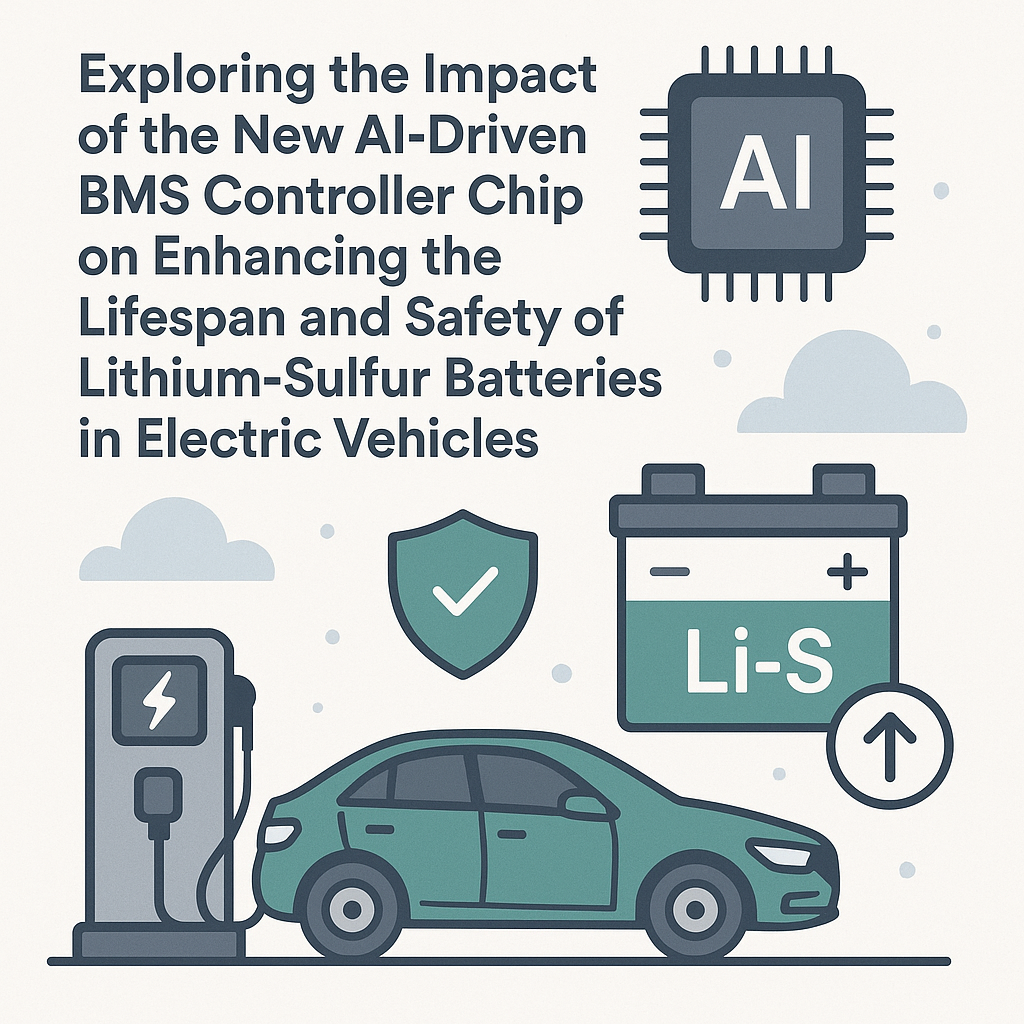Introduction
The rapid advancement of technology has opened new doors for the electric vehicle (EV) industry, particularly in the realm of battery management systems (BMS). One of the latest innovations is the AI-driven BMS controller chip, which has shown great potential in enhancing the lifespan and safety of lithium-sulfur batteries. This blog will explore how this new technology is reshaping the landscape of electric vehicles.
The Rise of Lithium-Sulfur Batteries
Lithium-sulfur batteries are gaining popularity in the EV market due to their numerous advantages over traditional lithium-ion batteries. Key benefits include:
- Higher energy density: Lithium-sulfur batteries can store more energy per unit weight, leading to longer driving ranges for EVs.
- Cost-effectiveness: Sulfur is abundant and less expensive than cobalt and nickel, making lithium-sulfur batteries more economical.
- Environmental benefits: Lithium-sulfur batteries are more environmentally friendly, as they utilize less harmful materials.
Challenges in Lithium-Sulfur Battery Technology
Despite their advantages, lithium-sulfur batteries face several challenges that impact their performance and longevity:
- Short cycle life: Lithium-sulfur batteries tend to degrade faster than lithium-ion batteries, resulting in shorter lifespans.
- Safety concerns: Thermal runaway and dendrite formation can lead to safety issues if not managed properly.
- Efficiency loss: The efficiency of lithium-sulfur batteries can drop significantly during charge and discharge cycles.
AI-Driven BMS Controller Chip: A Game Changer
The introduction of the AI-driven BMS controller chip offers innovative solutions to the challenges faced by lithium-sulfur batteries. Here’s how:
Enhanced Monitoring and Control
The AI-driven chip continuously monitors battery health by analyzing data from various sensors. This real-time data collection allows for:
- Predictive maintenance: By predicting failures and potential issues, the chip can alert users before significant problems arise.
- Dynamic adjustment: The chip adjusts charging and discharging rates based on battery conditions, optimizing performance and longevity.
Improved Safety Features
Safety is paramount in the EV industry, and the AI-driven BMS controller chip enhances battery safety through:
- Temperature management: The chip can detect overheating and adjust power output or initiate cooling mechanisms to prevent thermal runaway.
- Dendrite detection: Advanced algorithms can identify the early signs of dendrite formation, allowing for preventive measures to be taken.
Extended Lifespan of Batteries
By improving monitoring and safety, the AI-driven chip contributes to the extended lifespan of lithium-sulfur batteries. Key factors include:
- Optimized charge cycles: The chip ensures that batteries are charged and discharged efficiently, reducing wear and tear.
- Minimized degradation: Continuous monitoring and adjustments help minimize the factors that lead to battery degradation.
Real-World Applications and Case Studies
Several companies are already integrating AI-driven BMS controller chips into their lithium-sulfur batteries. These case studies highlight the technology’s potential:
- Company A: Implemented the AI-driven chip in their EVs, resulting in a 30% increase in battery lifespan and a significant reduction in safety incidents.
- Company B: Reported improved energy efficiency and battery performance, leading to longer driving ranges and enhanced customer satisfaction.
Future Prospects
The combination of AI technology and lithium-sulfur battery chemistry holds great promise for the future of electric vehicles. Expected advancements include:
- Integration with smart grid technology: AI-driven BMS chips could enable EVs to communicate with power grids, optimizing energy usage and charging times.
- Collaboration with renewable energy sources: Enhanced battery management could facilitate the use of lithium-sulfur batteries in solar and wind energy storage systems.
Conclusion
The AI-driven BMS controller chip represents a significant leap forward in enhancing the lifespan and safety of lithium-sulfur batteries in electric vehicles. By addressing existing challenges and optimizing performance, this technology not only improves the viability of lithium-sulfur batteries but also paves the way for a more sustainable future in the EV industry. As these innovations continue to evolve, we can expect to see even greater advancements in battery technology, ultimately leading to more efficient, safer, and environmentally friendly electric vehicles.



